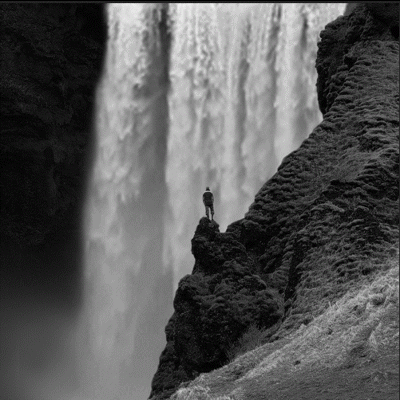Pesquisar este blog
sábado, 20 de setembro de 2014
Fernando Pessoa em poema
Presságio
O amor, quando se revela,
Não se sabe revelar.
Sabe bem olhar pra ela,
Mas não lhe sabe falar.
Quem quer dizer o que sente
Não sabe o que há de dizer.
Fala: parece que mente…
Cala: parece esquecer…
Ah, mas se ela adivinhasse,
Se pudesse ouvir o olhar,
E se um olhar lhe bastasse
Pra saber que a estão a amar!
Mas quem sente muito, cala;
Quem quer dizer quanto sente
Fica sem alma nem fala,
Fica só, inteiramente!
Mas se isto puder contar-lhe
O que não lhe ouso contar,
Já não terei que falar-lhe
Porque lhe estou a falar…
Fernando Pessoa
terça-feira, 9 de setembro de 2014
Martha Medeiros no Roda Viva
Martha Medeiros no Roda Viva: ‘Eu falo do mundo trivial. As pessoas pensam que o mundo é uma Ilha de Caras’
Num país que ainda lê tão pouco, o que faz Martha Medeiros ser lida por tanta gente? ”Eu falo do mundo trivial. As pessoas vivem pensando que o mundo é uma eterna Ilha de Caras”, resumiu no Roda Viva desta segunda-feira a escritora gaúcha que estreou como cronista há exatamente 20 anos. Somados os livros que publicou de lá para cá, foram vendidos mais de 1 milhão de exemplares. Ela encara o sucesso com a simplicidade que sublinha seus textos. Depois de afirmar que ainda está aprendendo a escrever ficção, disse que nem se considera uma cronista. Prefere definir-se como uma colunista que diz o que pensa sobre o que está acontecendo no mundo real ou sobre questões para as quais procura respostas.
Participaram da bancada de entrevistadores o escritor Marcelino Freire e os jornalistas Ivan Martins (Época), Mariana Kalil (Zero Hora), Marina Caruso (Marie Claire) e Fernanda Pompeu (Yahoo! Brasil).
http://veja.abril.com.br/blog/augusto-nunes/videos-veja-entrevista/martha-medeiros-no-roda-viva-eu-falo-do-mundo-trivial-as-pessoas-pensam-que-o-mundo-e-uma-ilha-de-caras/
segunda-feira, 8 de setembro de 2014
Solo Travelers
13 Things Only Solo Travelers Will Understand

Solo travel is the best way to break out of your shell and enjoy complete freedom. Solo travelers see the world in a different manner because they experience life from an angle not so many others get to see.
Many people love the idea of traveling the world, yet they never gather up the courage to just go. Because they don’t have friends who share their acute desire to go out and see the world, they exile travel to some other seemingly more appropriate time of their lives. Whenever the prospect of solo travel crosses their mind, however, they can’t help but imagine it as a lonely journey. In fact, they couldn’t be more wrong! Here are 13 awesome facts only solo travelers will understand.
1. They know that it’s never the perfect time to solo travel

The one epiphany that changed the course of my life is realizing that if I don’t go now, I probably never will. Circumstances will always be in the way, there will always be bills to be paid, there will never be enough money or enough planning done. There will always be just enough excuses stopping me from doing what I most desire in this life, which is a world trip.
2. They never blame others for unfortunate situations
I’ve messed up booking flight dates many times: sometimes going to the airport just to find out I am a week, if not a month, earlier than my actual flight! Other times, I’ve lost all my money after a robbery or a scam, but with no one to blame in such bad situations you have to take responsibility for your own mistakes. You learn from them and go on with your life — your awesome, unexpected life.
3. They are free as birds

You are the captain of the boat, you are your own guide, your own boss. Every decision you make is somewhere between dumb and genius. Either way it won’t matter, because it wont be judged. You are driving the car and all the paths are open. There are endless possibilities and countless chances to create leadership qualities in yourself. Isn’t that why you chose to be free in the first place?
4. They don’t ask for security, they ask for adventure

Your friends know you. When you’re in their company you’re supposed to behave in a certain way. However, as soon as you’re in a foreign land, you’re free from that box that you lived your whole life inside. You get out of your comfort zone, you try new things now, and you contemplate how magical your new life is because in the end, we only regret the chances we didn’t take.
5. They appreciate moments more

When you’re in front of an exquisite scene — be it a mountain peak, a tropical beach, or even someone so cute you just had to meet them — knowing you will be miles away in sooner than a week means you have no choice but to live that moment fully.
6. They turn into awesome storytellers

The skill of storytelling is not given to everyone, but with the practice solo travelers get from narrating their tales over and over again, they learn that details are what makes all the difference. Therefore, their note apps are usually their best friend on the road. To the introverts out there, this will boost your confidence speaking in public, which will improve your social life big time!
7. They make the road fun

When you’ve already been traveling for a couple of months, you will start noticing that if you don’t entertain yourself, no one will. The road only gets lonely if you don’t make any effort bonding with locals or other travelers, and you’ll end up getting bored while missing out on a lot of fun times.
8. They feel weird about homesickness


Solo travelers usually never want to go back home and put an end to their long trip. But when they do get home, they want to leave right away, so they immediately start planning their next big trip.
9. They have a home in every corner of the world

The thought of being able to travel anytime and anywhere you desire and still have a free place to stay is what you call amazing! Couchsurfing the globe makes it sweeter, and building international friendships makes it fascinating.
10. They know how to dodge every scam out there

The hard-learned lessons turn out to be the best advice solo travelers can give to other people on the road or their friends back home. How to avoid the traps they fell for before and how to make the best out of such bad situations also make traveling easier and easier for them as time goes on.
11. They know that the destination does not matter

It’s all about the journey, the laughs, the memories, the food, the ups and downs, the spontaneous decision to derail from your plans: that’s what so addictive about solo travel.
12. They discover an entirely new meaning of time

“The whole point of long-term travel is having the time to movedeliberately through the world. Vagabonding is about not merely reallotting a portion of your life for travel but rediscovering the entire concept of time.” — Rolf Potts. A wise traveler is always flexible with dates, never setting limits to a trip and missing out on potential adventures. A wise solo traveler will always recommend that you slow down.
13. They constantly find themselves in situations like these

Me when I just got into my hotel room two minutes ago and can’t find my iPhone

Trying to catch a flight after your alarm didn’t wake you up in time

How my mom wants me to feel

When I have to catch an early flight

Packing when I’m hungover

When you don’t know the proper greeting in a different country so you try everything
One last note
Travel may take several forms and each person has their favorite. Whether solo, duo, or in a group; by planes, by car, by trains, by bike, or on foot; either backpacking, doing extreme sports, or luxurious sightseeing; or whether it be for a weekend city escape, a month-long vacation, or a year around the world. Whatever it is, it will do you wonders. Little by little, as this addiction to travel grows, you will grow with it to become the person you always dreamed you’d be.
http://www.lifehack.org/articles/lifestyle/13-things-only-solo-travelers-will-understand.html
sexta-feira, 5 de setembro de 2014
1964: con él llegó el escándalo...

Pier Paolo Pasolin en su película 'El Decamerón' (1971).
“¿Pensar sobre su vida sexual es algo que a usted le proporciona placer o le genera inquietud?”. Esta es una de las preguntas que Pier Paolo Pasolini (Bolonia 1922 – Ostia 1975) les hizo a los italianos hace medio siglo en su película Encuesta sobre el amor (Comizi d’amore 1964). Con cámara y micrófono en mano Pasolini recorrió Italia interrogando a la gente del campo, de la ciudad, niños, jóvenes y viejos, obreros y estudiantes, mujeres “decentes” y prostitutas sobre la sexualidad, la homosexualidad, la igualdad de derechos entre el hombre y la mujer, la virginidad, el divorcio (que aún no era permitido) y sobre la prostitución que entonces había sido desplazada a las calles por la Ley Merlín de 1958 que había prohibido los burdeles.
Italia “cambiaba de cara”, pasaba de una sociedad campesina a una industrial, de las sombras de la posguerra y del poder fascista a las redes del “poder consumista”, que para Pasolini “violaba y manipulaba la realidad de los cuerpos”.
El título original de Encuesta sobre el amor era Cien pares de bueyes (Cento Paia di Buoi), explica Roberto Chiesi del Archivo Pier Paolo Pasolini en Bolonia, y añade que la cinta iba a tratar exclusivamente de las perversiones sexuales. En el boceto de diez páginas Pasolini no explicaba cómo escenificaría a “las víctimas del lado oscuro del sexo, de los instintos animales no controlados”, pero sugería describir algunos casos a manera de crónica negra. Los productores rechazaron la propuesta y Pasolini tuvo que cambiar el formato a uno de tipo documental. El psicoanalista Cesare Musatti, los escritores Alberto Moravia y Giuseppe Ungaretti participan de la película en charlas con Pasolini sobre el sexo como tema tabú en la Italia antes de la revolución sexual.
La propia vida sexual de Pasolini era tema de escándalo. En 1949 había sido acusado de seducir, pervertir y mantener relaciones homosexuales con chicos adolescentes a quienes daba clase en Casarsa, el pueblo natal de su madre por quién, se dice, sentía un amor morboso. Pasolini, hijo de padre fascista, era comunista y homosexual y aunque no fue encontrado culpable de los cargos en su contra, fue despedido de la escuela y expulsado del partido. Con su madre parte a Roma, donde encuentra en los barrios de la “vida violenta” a los ragazzi di vita (título de su libro de 1955), menores de edad a quienes convencía de tener relaciones sexuales incluso de carácter violento. En sus dos primeras películas Accatone (1961) y Mama Roma (1962) muestra de manera épica la segregación del subproletariado italiano, un mundo que había conocido también a través de su lujuria homosexual, errante y anónima.
¿Ante ciertos excesos sexuales usted se escandaliza o no?
Pier Paolo Pasolini
La vida y obra de Pier Paolo Pasolini se convertiría en un solo cuerpo poético. Un cuerpo que “pedía sanar en público y con el público llagas privadas”, como diría su biógrafo Enzo Siciliano. Su cine y literatura eran también su “cuerpo de lucha” y de intervención en el debate público.
Encuesta sobre el amor (su tercera película) es “clave en la filmografía del cineasta ya que aparecen los temas que serán fundamentales en la evolución de su cine final: la transformación antropológica y cultural de Italia, el consumismo y sobre todo el sexo”, señala Javier Fuentes Feo, director del Centro de Documentación y Estudios Avanzados de Arte de España.
Algunas de las preguntas que Pasolini hace en Encuesta sobre el amorson: “¿Usted tiene inhibiciones sexuales?, ¿puede definir el honor sexual?, ¿el matrimonio ha resuelto sus problemas de sexo? ¿por qué elige el camino de la ‘decencia’ si podría ganar más dinero como prostituta?, ¿un matrimonio pequeño burgués o proletario es la solución a su pobreza?, ¿prefiere ser un don Juan o un buen padre?. Algunas de las respuestas que obtiene son: “El honor sexual se refiere solo a las mujeres” “La sociedad está basada en la familia, la nación se basa en la sociedad y por lo tanto el divorcio es una traición”. Pasolini: “¿qué relación ve usted entonces entre la sexualidad y el amor patriótico?”.
El sexo (heterosexual) de la vida en pareja o fuera de ella es un tema de la encuesta. El otro son las relaciones sexuales “anormales”. Pasolini: “¿Ha oído hablar de perversiones sexuales? ¿Por qué piensa que un hombre es invertito (homosexual)? ¿Qué piensa sobre un hombre así?, ¿cree que se le puede curar? ¿ante ciertas anormalidades, ciertos excesos sexuales usted se escandaliza o no?”.
La propia vida sexual de l cineasta, poeta e intelectual era tema de escándalo
Encuesta sobre el amor no es una investigación sociológica sobre la sexualidad de los italianos. “La película y la obra posterior del cineasta es un testimonio cinematográfico que muestra la deriva de un mundo que se abre en los cuerpos, el tránsito a algo que para Pasolini, actuaba con mayor fuerza que el fascismo tradicional: el consumismo”, destaca Javier Fuentes Feo, director del Centro de Documentación y Estudios Avanzados de Arte de España.
En su escrito Abjuración de la trilogía de la vida (junio 1975) Pasolini explica que en el inicio de la crisis cultural de los sesenta “cuando empezaba a triunfar la comunicación de masas, el último baluarte de la realidad parecían ser los cuerpos inocentes con la arcaica, oscura y vital violencia de sus órganos sexuales”.
Si Encuesta sobre el amor es un documento sobre la Italia de la represión, en sus películas de la Trilogía de la vida (Decamerón (1971), Los cuentos de Canterbury (1972) y Las mil y unas noches (1974)) Pasolini hace una “visualización total del eros”. Pero se arrepiente posteriormente de esa “representación del erotismo” porque siente que ha sido también “instrumentalizado” por el “poder integrador del consumismo”.
En la entrevista titulada La poesía no se consume que concedió a Guiseppe Cardillo en 1969 Pasolini había expresado que “hay cosas que el sistema no puede digerir. Una de ellas, la poesía. “La poesía es inconsumible en lo más profundo, yo quiero que sea lo menos consumible posible también exteriormente…haré cine cada vez, más difícil…para que sea lo menos consumible posible”.
La respuesta a esto fue Saló o los 120 días de Sodoma (1975) su última película. En Saló, la relación sexual sodomita, la transgresión, es convertida en norma. Para Thierry Jobin, director del Festival de cine de Friburgo, Saló “impone un espejo a los italianos que les devuelve el miedo que mostraron en Encuesta sobre el amor, el miedo al cambio, a liberarse de lo que había sido la violencia fascista y el rigor católico”. Por el contrario Roberto Chiesi opina que en Saló el cineasta presenta una “metáfora de la tolerancia y permisividad de los años 70, que esconden para Pasolini la imposición de un único modelo de sexualidad, la heterosexual”.
En Encuesta sobre el amor Pasolini entrevista al escritor Ungaretti y le pregunta si existe la anormalidad sexual y de qué manera él transgrede la norma. Ungaretti le responde: “Yo personalmente soy un hombre, soy un poeta, por lo tanto ya empiezo a transgredir todas las leyes haciendo poesía”, palabras que hubieran podido salir del mismo entrevistador.
http://cultura.elpais.com/cultura/2014/09/04/actualidad/1409854913_277692.html
Assinar:
Postagens (Atom)